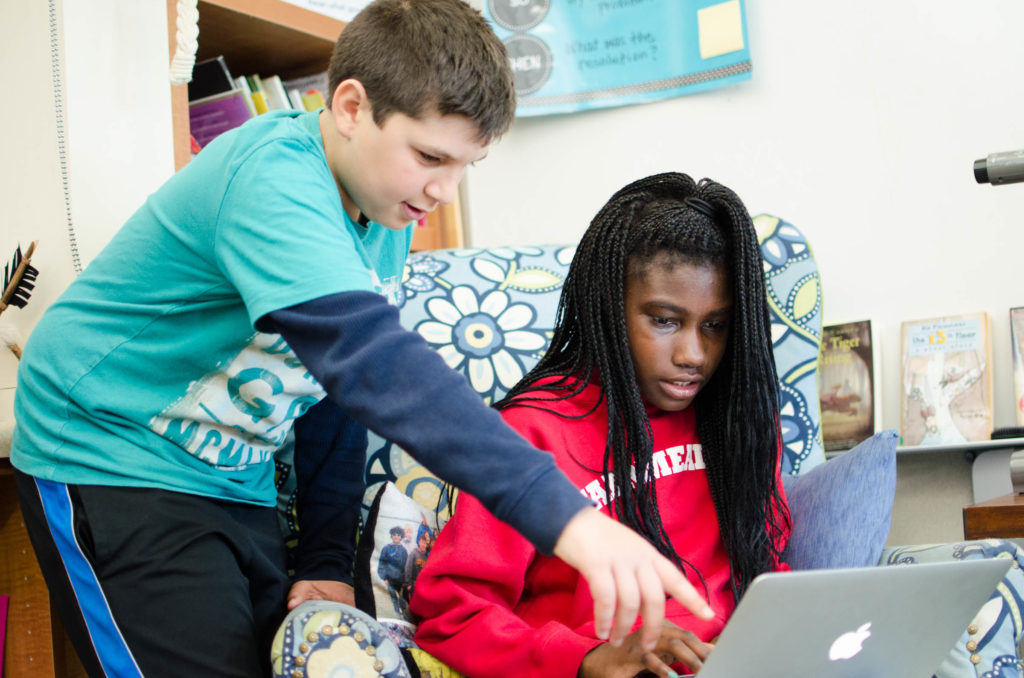
Table of Contents
5 Ways Learning to Code Helps Kids Succeed in School
It’s August, which means that many kids are going back to school! Time for them to learn subjects that will help them succeed in life, like writing, math, science, and more. Did you know that learning to code can help your child develop skills that are valuable across all subjects, like precision, problem-solving, and logical thinking? Read on to learn how your child can improve their school performance as they learn to code!
1. Precision
Because computers interpret every line of code at face value, programmers have to make sure their code is perfect in order to run correctly. Properly placed elements like quotation marks, HTML tags, and capital letters all play a role in executing code. Kids can get into the habit of being precise as they code, whether they’re using Tynker Blocks or a real programming language.
For example, in Tynker’s ‘Mind Crafters’, kids must use a ‘repeat’ block and correctly choose how many times a character should move forward so that it clears all the flaming hoops.

Read how coding helps kids be concise and precise as they practice storytelling!
Whether kids are writing a sentence in an essay or performing a math calculation, every letter or number matters: When they’re graded on assignments, students can get average grades when they demonstrate proficiency. But it’s only the students who show that they have read and followed all of the instructions–who have paid precise attention to every detail–who earn top grades.
2. Logical Thinking
Lines of code need to be written in a certain order for the program to run correctly. As kids code, they will understand that, in order for something to work, there are steps that need to be performed in a specific order. Learn more about algorithms–a series of steps that a computer follows to perform a task, and another example of why logical thinking is so crucial in programming.
With many school tasks, kids need to perform steps in a logical order to get a desired outcome. For example, when performing a math equation, students need to remember ‘PEMDAS’ (parentheses, exponents, multiplication, division, addition, subtraction) to solve a problem that involves the order of operations.

3. Problem-Solving
When kids learn to code, there will be times when the program will not run as expected. They’ll need to look at the code again and identify at what point things went awry. Do they need to scrap everything they’ve done and start over completely, or do they just need to re-work things from a certain point?
As they practice problem-solving while coding, they can apply those skills–like identifying the problem before starting over completely–in their school classes. Is your child writing a play? Solving a geometry problem? Making chemical reactions? As kids do any assignment, there is always the possibility that the results won’t be perfect the first time around.
That’s why learning how to identify and solve problems is so crucial! They may need to re-write a key scene in their play so that the plot makes sense, re-do their geometry problem, and try the science experiment again. Teachers report that learning to code with Tynker helps their students understand abstract concepts–a key skill when solving math problems!

4. STEM
Learning to code doesn’t just help kids develop skills that transfer to the classroom–it’s an interactive medium that students can use to explore key school subjects!
With Tynker, your child can deepen their understanding of other subjects with coding projects such as an ocean ecological pyramid, an interactive model of our solar system, a Bill of Rights game, and more. Kids can learn and apply coding skills while simultaneously enhancing their knowledge of science, English, math, and everything in between!

5. Persistence
While kids are learning how to be precise, follow steps in a logical order, solve problems, and using code to demonstrate knowledge of any school subject, there’s one character trait that’s crucial: persistence! Without the willingness to try and keep trying even when they make mistakes, kids doing a school assignment (or programmers making the next big app) won’t get very far.
As they code games and projects, kids will learn that they have to continually practice in order to make great programs. They can then apply this determination to all their school subjects, making persistence a habit that they use in all tasks they take on.
Learning to code also helps kids develop other ‘soft skills’ like focus and communication!

As your child starts school this year, make sure that they’re taking advantage of all the ways learning to code can help them develop key skills for success! We hope everyone has a great school year and that coding helps your child become the best student they can be.
Looking for ways for your child to learn to code? Check out Tynker’s 39 programming courses, 11 iPad courses, 3 iPhone courses, and 3700 learning modules, with interest-driven paths to help your child have fun while learning to code!




